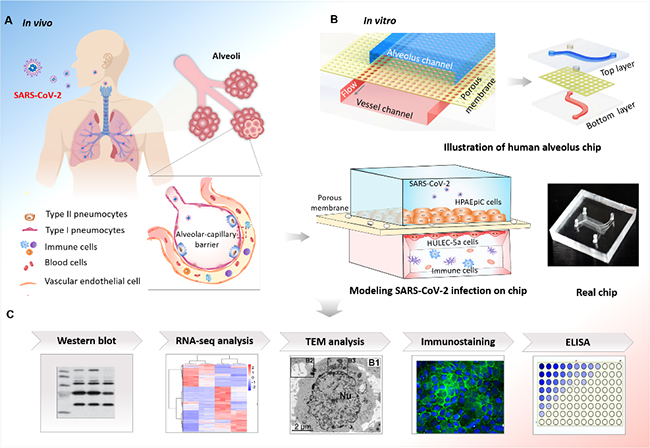
Newsroom
Coronavirus disease 2019 (COVID-19) is a global pandemic caused by severe acuterespiratory syndrome coronavirus 2 (SARS-CoV-2). The human lung is the primary target of SARS-CoV-2 infection.
Till now, the in-depth mechanism of the pathogenesis of COVID-19 remains elusive. The models that can accurately resemble human-relevant responses to this novel viral infection are still lacking.
Recently, a research team led by Prof. QIN Jianhua from the Dalian Institute of Chemical Physics (DICP) of the Chinese Academy of Sciences (CAS) and Prof. ZHENG Yongtang from the Kunming Institute of Zoology (KIZ) of CAS developed a biomimetic human disease model that allows to recapitulate the SARS-CoV-2-induced lung injury and immune responses on organ chip system.
This study was published in Advanced Science on Oct. 24.

Schematic diagram of microengineered human alveolus chip infected by SARS-CoV-2 (Image by ZHANG Min)
Organ chip is a bioengineered microfluidic cell culture device that enables to reflect the key function of human organs at physiologically relevant manner.
The researchers created a biomimetic human disease model that allowed to resemble lung injury and immune responses induced by SARS-CoV-2 in vitro at organ level. This microengineered human lung chip reproduced the key features of alveolar-capillary barrier by co-culture of human alveolar epithelium, microvascular endothelium and circulating immune cells under fluidic flow in normal and disease conditions.
Upon SARS-CoV-2 infection, the epithelium exhibited higher susceptibility to virus than endothelium. Transcriptional analyses showed activated innate immune responses in epithelium and cytokine-dependent pathways in endothelium following viral infection, revealing the distinctive responses in different cell types.
Notably, viral infection caused immune cell recruitment, endothelium detachment, and inflammatory cytokines release increase, suggesting the crucial role of immune cells involving in alveolar barrier injury and exacerbated inflammation.
The established disease model system was also used to test the candidate anti-viral drugs, demonstrating the potential of this organ chip for repurposing drugs against SARS-CoV-2.
This microengineered organ chip system reflects the major patho-physiology of COVID-19 by closely mirroring human-relevant pathological lung injury, vascular disruptions and immune responses to SARS-CoV-2 infection at organ level, which is difficult to be achieved by existing in vitro models.
The chip platform has the accessibility to study responses of various cells to virus in real time simultaneously, and to rapidly test candidate drugs with low cost and short time. It may provide unique and promising platform for accelerating SARS-CoV-2 research and the development of new therapeutics against COVID-19.
